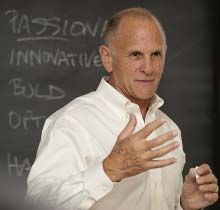We have heard a lot in the last few days about the changes taking place at the top in two landmark Silicon Valley companies: Apple and Google. These announcements have prompted several good articles and editorials on the role of the company founder, speculating on what will happen at Apple when Steve Jobs takes medical leave and Tim Cook takes over, and what Google founder Larry Page needs to do to get ready to take over from Eric Schmidt. (See, for example, Chris O’Brien’s column in the January 23, 2011 issue of the San Jose Mercury News.) In general, the message seems to be that often the founder needs to play a critical role at the helm of an entrepreneurial organization, largely because of the founder’s visionary gifts and personal commitment. In fact, O’Brien argues that founders make the best CEOs.
One element that is not talked about much and I feel is particularly important transcends commitment or vision. It has to do with the energy that the founder’s presence injects into the whole organization. This is intangible, and is often as much about people’s perceptions as about the functional day-to-day role that the founder plays.
I fully understand that there are times when the founder needs to step in and take the top job. I have experienced this in both directions: I had to step down when the group from which I was seeking funding felt that I did not have enough experience to be the CEO; and I stepped back in when events at the company demanded that I take full charge of the helm again. Yet in my mind, what was critical for our company was not so much the role I played, but that I, as founder, was always present and fully vested in the future of the company. It infused the company with a sense of continuing creation, a sense that the organization was truly entrepreneurial.
This does not mean that professional management is not required. On the contrary, the best of founding entrepreneurs often have major gaps in their skills. If they are wise, they bring in companions as close partners to complement their shortcomings. In the early years, this is what gave HP its power: the complementary skills of Bill Hewlett and Dave Packard. It was the case at Raychem, one of the leading non-computer companies in Silicon Valley in the 80s and 90s, where founder Paul Cook relied heavily on Bob Halpern as his essential counterpart on the operations side. It seems that even at Apple this is the case: Tim Cook provides an invaluable balance on the operations side to Job’s visionary talent. It also seems to be the case at Facebook, where young founder Mark Zuckerman has Sheryl Sandberg at his side to make sure the company is well run.
So I propose that a key, defining factor in the “entrepreneurship” character of a company is how the primal energy of the founder continues to be felt by the organization.
Most of the time, this requires his or her physical presence –often as the CEO. In some cases, just as with the spiritual influence of a wise teacher who is no longer present, for some period of time the lore and aura of the founder may continue through stories and practices after the founder leaves. But this energy eventually dissipates and the entrepreneurial organization becomes a more traditional, professionally managed company. Yet here again, to the extent that the organization can keep some of the “entrepreneurial spice,” it is ahead. The challenge for “acquired” management is how to accomplish that.
